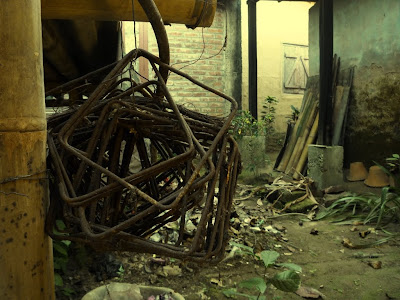Some look into an album to go back to yesteryears. Some others just look into the eyes of a child.
----------------------------------------------------------------------------------------------------------------------------------
Amidst the chaos of our everyday life, we tend to look out for some small pockets in time as well as in space where we could comfort our senses. These pockets can be anything – a view from a rented window, the undated thoughts on a dated letter, the last few puffs of a cigarette shared among three friends, the wait for a vacation, the stories narrated in a book by the myriad combinations of alphabets… Every person on earth stitches his own pockets of solace and although we seem to borrow from each other, we nevertheless pick from our own pockets. One such pocket that seems to be common to all humans alike is the sight of a child.
I realized of owning one such pocket when I was once heading to Muradnagar, Ghaziabad. I was accompanying a friend who ran a small school there, right in the middle of a densely populated slum. I was taken to a small wooden gate, loosely closed by a latch and which looked like any other ordinary gates in the area. I was wondering what we were doing there when we were supposed to visit the school. Just then my friend opened the gates for me. The moment I stepped in, I knew it was not an ordinary place.
Before me were two doors, one slightly ajar, while the other was wide open. My friend led me through the first one, to something that looked like a primitive classroom. Seated before me, and looking straight into my eyes were three rows of children. That sure made me nervous. Facing a review panel for a project is much easier. Atleast I know what their expectations are from the project – the dollar savings and what not. But these children, each of them had a question in their stare that seemed to differ from the others’. A sea of questions, each simple and yet difficult to answer. I wore my best mirror-practiced smile as the only defense to wade through it. The kids were dressed in almost everything that has been and out of fashion: baggy jeans, oversized jackets, colorful sweaters, scarves, tunics, skivvies, and monkey caps.
I was asked to tell the kids about Mumbai. When I started, they did not know anything about Mumbai except the name. Whether it was in India or Pakistan, whether it was a village or a Delhi like city, they did not know. When I finished my stories of Mumbai, they knew Bollywood, the Arabian Sea, the Gateway of India, the monsoon rains, and the Taj Mahal hotel. I had a few pictures of Mumbai in my digital camera which I showed them. To conclude my small talk, I asked them if they wanted to go and see Mumbai. The kids roared a YEAAA in unison.
That sight, the sight of the children seeing things through my eyes, believing every story I told like the stories they read in some Nagraj and Chacha Chowdhury comics at the kabariwallah shop, and envisaging everything the pictures of which I had not in my camera, that sight of a class in awe of a fancy filled bona fide world unfolding before them was something that can only be felt, and not captured by any cameras.
I felt sad at their ignorance, but then I was glad when I thought about what I have seen elsewhere in the country. Once when I was enjoying the sunset on top of a sand dune in the Thar Desert, some 60 miles west of Jaisalmer, a middle-aged man with a long moustache and an oversized turban approached me. He was with his six year old daughter.
He said, “Sir, traditional banzara dance, only ten rupees”. I was taken aback, not because of the cheap pass to a three minute dance spectacle, but for the age of the girl. I asked him why he did not take her to a school. He said there were none anywhere nearby. What mattered to him was the two hours before the winter sun would set, the few fleeting hours of the year that he could use to wade through the other seasons when the sun would be hotter.
The kids in this school had their copies and pencils, some torn textbooks, a few benches under a roof to sit upon, a blackboard, and a teacher. These may not be the best of the instruments, but definitely something when compared to the banzara girl. And the efforts of my friend and all others who help running this school is duly rewarded when they see the kids coming back for classes the following day.
I took pictures of most of the kids in the school. As a return gift, they recited me a few poems.
I’m sharing a few pictures of the school, hope the reader is able to relate to it.
Some kids posing for the camera
These kids were not in the school. They just hung in there at the gates with a shy expression on their faces
A view from outside the classroom
The bisleri plant
Saheli
Questioning eyes
We are the world - the kids just ganged up for this picture. In the end, they were all around me. Guess I needed a 3D camera to capture them all.
A class session
After the final bell
Finally... the teachers
=========================================================================
The school in the story is an effort of the NGO “Jatan Sansthan”. Jatan was formed in 2006 by a group of college friends to work for the underprivileged children. Today the organisation has setup schools in Muradnagar and Nagpur and survives only on the donations of the well-wishers. For more information on Jatan, please get in touch with the author




















